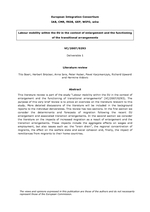Labour Mobility Study
Labour Mobility - Background Analyses - The impact of labour mobility on public finances and social cohesion
Tito Boeri and Paola Monti
in: Labour Mobility - Background analyses
Labour Mobility Study ,
Most Europeans fear that immigrants are a fiscal burden via their disproportionate participation in the generous social welfare programmes of the EU. However, to date there has not been any systematic attempt to evaluate the net contribution of migrants to welfare systems. The purpose of this background note is to contribute to filling this gap.
We first draw on data from the EU-SILC surveys to understand whether migrants to EU countries tend to be disproportionately represented in the population of beneficiaries of social transfers. Descriptive statistics point to marked differences - with respect to natives - in migrants' access to contributory and non-contributory benefits; migrants appear to be under-represented among the recipients of contributory benefits, while the opposite is true for non-contributory allowances, such as social assistance and housing benefits. This contributes to explain the widespread perception of welfare abuse. However, once we control for confounding factors which are likely to correlate with migrant status and influence the likelihood of receiving non-contributory benefits, (i.e., relevant individual and household characteristics), we find that migrant status has little - if any - impact on the likelihood of being a recipient of social welfare benefits. Next we carry out a (static) analysis of the net fiscal position of natives' and migrants' household with respect to the government; adding up how much they contribute to the state budget via payroll and income taxes and how much they draw from it in terms of access to a variety of welfare programmes. Our analysis suggests that migrants pay lower taxes than natives, and yet a significant portion of migrants are net-contributors to the state budget. Finally, we analyse the determinants of public opinion perceptions about immigrants in the EU countries; in particular, we analyse whether negative perceptions about migration are stronger in countries with a more generous redistributive system, or adopting specific migration policies. This analysis sheds light on the optimal interaction of social and migration policies that could cope with the concerns of public opinion with respect to migration from both New Member States and non-EU countries.
Countries covered: European Union, New EU Member States
Research Areas: Labour, Migration and Income Distribution
